Germany Cans Its A340 ‘Air Force One’ Jets After Two Failures In 24 Hours
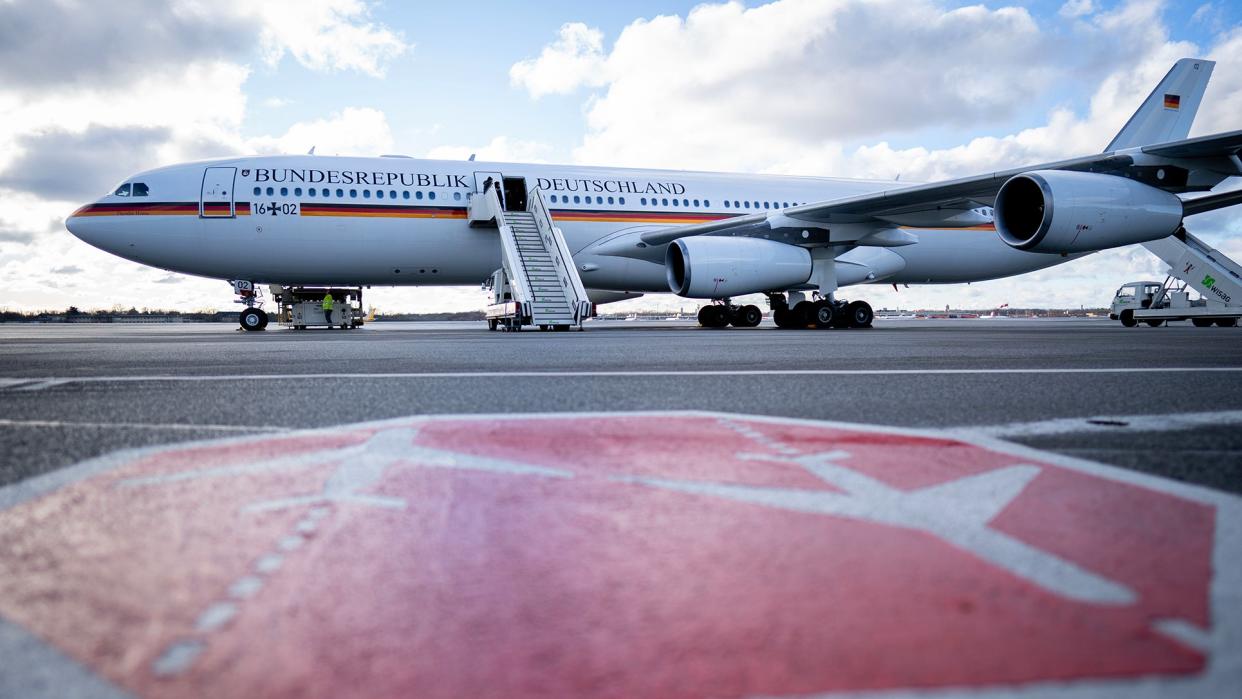
- Oops!Something went wrong.Please try again later.
- Oops!Something went wrong.Please try again later.
The German Air Force has decided to immediately retire its two Airbus A340 VIP transport aircraft, which are used to fly the German chancellor and other leading officials on long-haul trips around the world. The snap decision comes in the aftermath of an embarrassing episode in which two technical problems suffered by one of the ‘Air Force One’ jets forced German Foreign Minister Annalena Baerbock to cancel her trip to the Asia Pacific region.
While the German Air Force, or Luftwaffe, has already introduced three new A350s, as part of a wholesale modernization of its VIP fleet, the latest development adds to a catalogue of problems with aircraft availability that has also affected other parts of its inventory in recent years.
Taking to Twitter, the Luftwaffe announced today: “We will take the two A340s out of service as soon as possible, i.e. in the coming weeks, ahead of schedule.”
https://twitter.com/Team_Luftwaffe/status/1691360798134722560?s=20
The air force added that the two A340-300s were originally scheduled to be retired in September 2023 (aircraft 16+02) and at the end of 2024 (aircraft 16+01). The second of these was the jet that left Foreign Minister Baerbock stranded in Abu Dhabi.
“With the A350, the Flight Readiness Service has a robust and modern aircraft available for long-haul flights,” the Luftwaffe added.
The Flight Readiness Service, or Flugbereitschaft, is the Luftwaffe’s VIP and specialist transport arm, based at the international airport in Cologne, in the west of Germany.
https://www.youtube.com/watch?v=3YmGTmlm3v0
Interestingly, the Luftwaffe had previously issued a series of tweets explaining the problems that had affected 16+01 earlier this week. This aircraft had originally departed Germany on Sunday for what was planned to be a week-long trip.
Yesterday, in a tweet that began with the words “safety first!” the air force reported that the four-engine A340 had to return to Abu Dhabi after taking off from there. “Due to a technical fault, the wing flaps could not be retracted correctly. We are working at full speed to enable our guests to continue their journey and will inform you when it resumes,” the Luftwaffe stated, adding that the A350s were not available for this mission, due to undisclosed other commitments.
https://twitter.com/Team_Luftwaffe/status/1690927696832806912?s=20
The fault reportedly appeared after refueling in Abu Dhabi, leaving the minister “stranded for hours while the technical crew battled to fix a problem with the wing flaps,” according to the AFP news agency.
Hours later, the Luftwaffe tweeted that it had undertaken a functional check flight and posted a screen capture from the ADS-B Exchange website, a popular flight-tracking service aggregator.
https://twitter.com/Team_Luftwaffe/status/1691142355598848000?s=20
“There were no problems,” the Air Force said. “We are therefore planning to continue our journey to Sydney later this evening.”
Later that day, the next update brought more bad news:
“A340 — Mission aborted!” the Luftwaffe tweeted. “The problem occurred again with the now fully refueled machine. We are now landing back in Abu Dhabi.”
https://twitter.com/Team_Luftwaffe/status/1691202758152527872?s=20
In the following video, posted to social media by Christoph Schult, a journalist for Der Spiegel, the A340 captain can be heard explaining to Foreign Minister Baerbock and her delegation that the aircraft is having to dump fuel and return to Abu Dhabi because of the recurring flap problem. This happened overnight to Tuesday, local time.
The captain adds that “nothing like this has happened” before.
https://twitter.com/schultchristoph/status/1691221579764547587?s=20
The next tweet on the Luftwaffe’s official account confirmed the decision to retire both the A340s early.
As for Baerbock, she had been planning to visit Australia, New Zealand, and Fiji, before the trip was canceled. Taking to Twitter, her frustration at the situation was palpable:
“We have tried everything: Unfortunately, it is logistically impossible to continue my Indo-Pacific journey without the broken plane. This is more than annoying.”
https://twitter.com/ABaerbock/status/1691312170808573952?s=20
Baerbock continued: “In the Indo-Pacific, we not only have close friends and partners. The region will decisively shape the world order of the 21st century. That’s why substantive and personal exchange is so important.”
Baerbock was expected to return to Germany on a commercial flight.
The A340 in question is 23 years old and previously served as a commercial airliner with Lufthansa, but it’s not too much to expect that it would have been very well maintained by the Air Force, while its prestige role should also mean that it’s available when required.
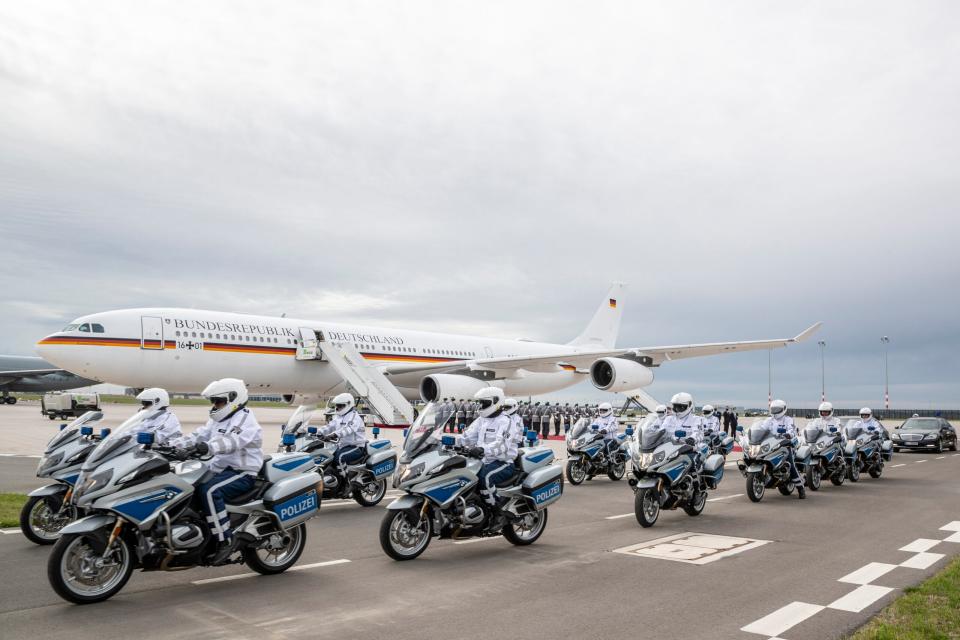
However, previous technical problems have also prevented the same aircraft from undertaking important duties.
Most notably, back in 2018, the-then German Chancellor Angela Merkel’s trip to the G20 summit was delayed, due to an electronic fault on the jet.
Other embarrassing episodes have affected the Luftwaffe VIP fleet in recent years, too.
Also in 2018, Olaf Scholz — then the finance minister, now the chancellor — was forced to take a commercial flight back from Indonesia after rodents chewed cables on the same A340.
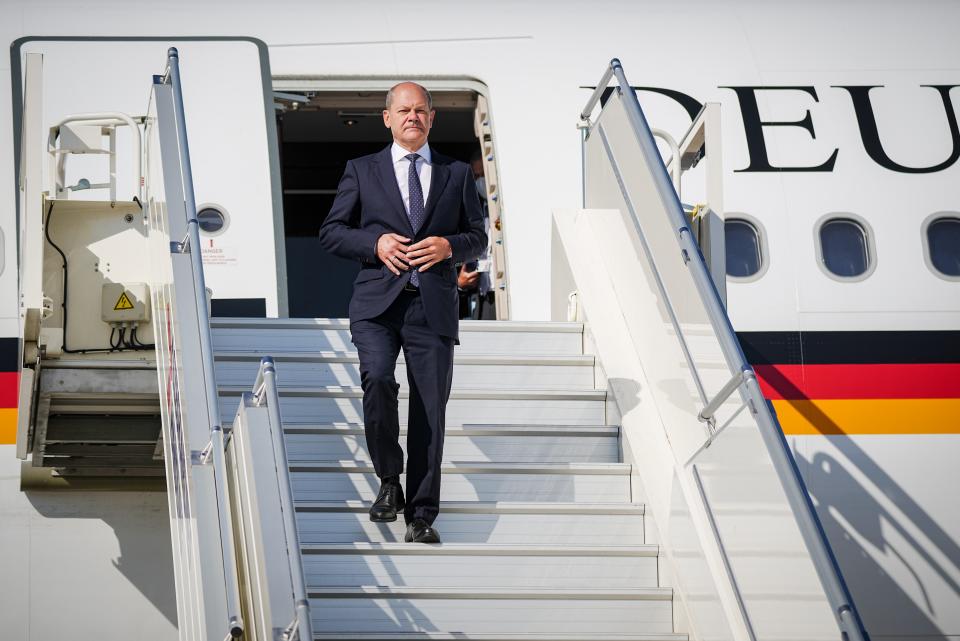
In May this year, Baerbock was again stranded in the Middle East, after her aircraft suffered a flat tire in Qatar. She was forced to extend her visit there by a day.
Although these incidents don’t necessarily reflect badly on levels of maintenance, they have certainly been picked up by the German media and add to general concerns over Luftwaffe aircraft availability.
After the government in Berlin spent $1.3 billion on three new A350s, the VIP fleet should be in good shape for future long-haul missions. However, the repeated problems with the A340 fleet do raise questions over general levels of maintenance and availability.
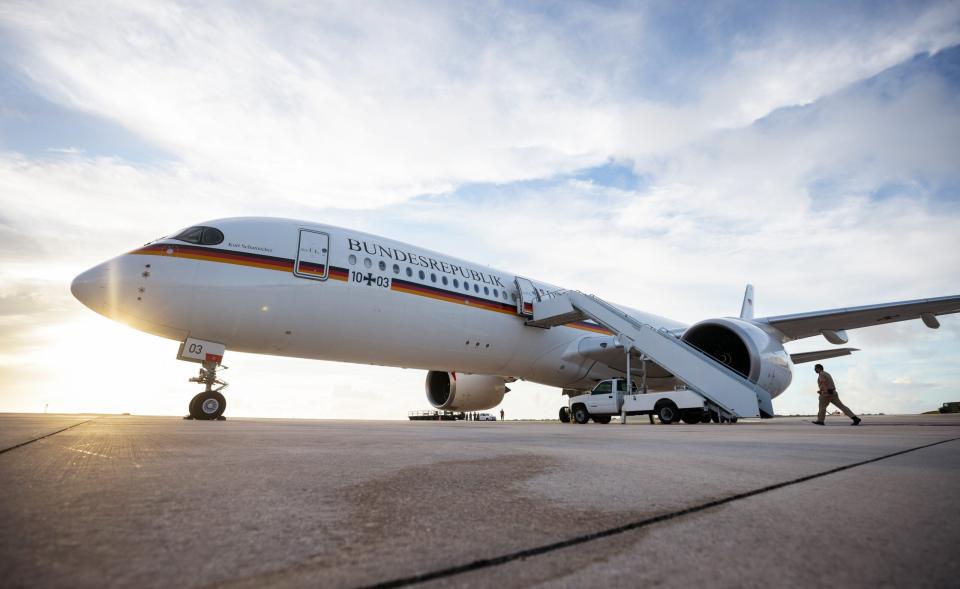
https://twitter.com/SpaethFlies/status/1691087102534975489?s=20 https://twitter.com/BaainBw/status/1592865103489236992?s=20
The A350-900s are part of a Flight Readiness Service fleet that is now one of the most modern anywhere in the world.
For short- and medium-haul missions, the service also operates three twin-engine A319s and three A321s, as well as three Global 5000 and Global 6000 bizjets.
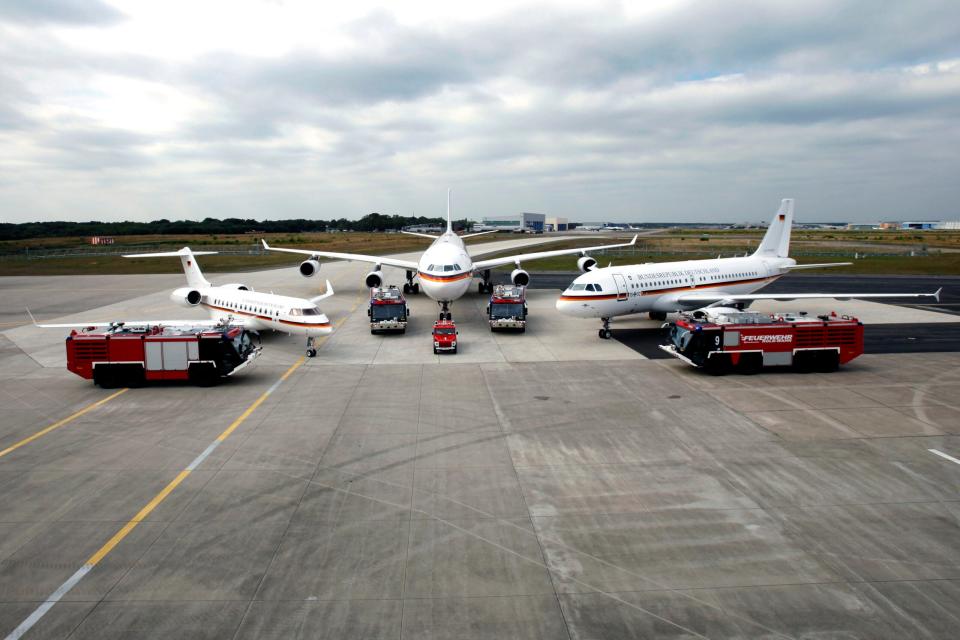
Based in Berlin, meanwhile, are three VIP-configured AS532U2 helicopters, while the Flight Readiness Service is also responsible for the Luftwaffe’s aerial refueling fleet, comprising A330 MRTTs operated as part of the Multinational Multirole Tanker Transport Unit.
However, the Luftwaffe has repeatedly been criticized for failing to meet adequate levels of aircraft availability.
Back in 2017, for example, it emerged that only around 35 percent of the Tornado combat aircraft fleet was combat-ready at any given time. While a replacement has now been lined up for these jets, they continue to serve, for now, alongside the newer Eurofighter EF2000, which has suffered from availability problems of its own.
In June 2020, the German Ministry of Defense announced that there had been a “positive trend” in Eurofighter serviceability over the previous 12 months.
“During this reporting period, the squadrons had about six more Eurofighters available for flight operations each day than on average during 2019,” the defense ministry said. “Overall, the number of operational Eurofighter has increased by 50 percent in the last three years. As a result, the development of flight hours also shows a positive trend,” it added.
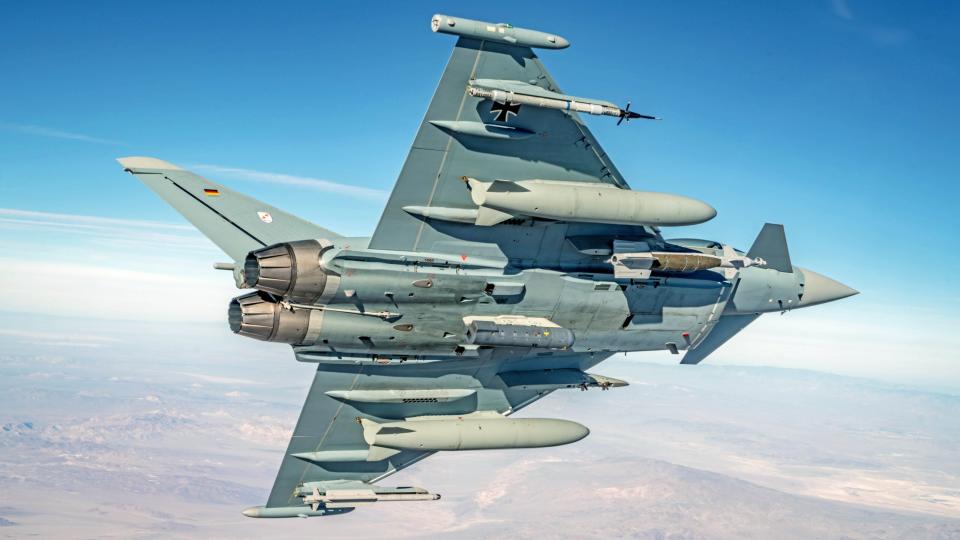
As well as pilot shortages of the kind that many Western air forces contend with, the rolling upgrade programs for the Eurofighter have also limited the number of jets that are ready on the flight line each day. In recent years, as many as 40 percent of the Luftwaffe Eurofighter fleet has been undergoing modification. A lack of spare parts further compounds the problem.
These kinds of issues are also not restricted to the Luftwaffe’s aircraft. In the past, we have reported on problems faced by the Germany Army’s helicopter fleets. As of November 2019, just 15 percent of German Army Tiger attack helicopters and only around 12 percent of its NH90 transport helicopters were mission capable. The Tiger is now also headed for an early retirement.
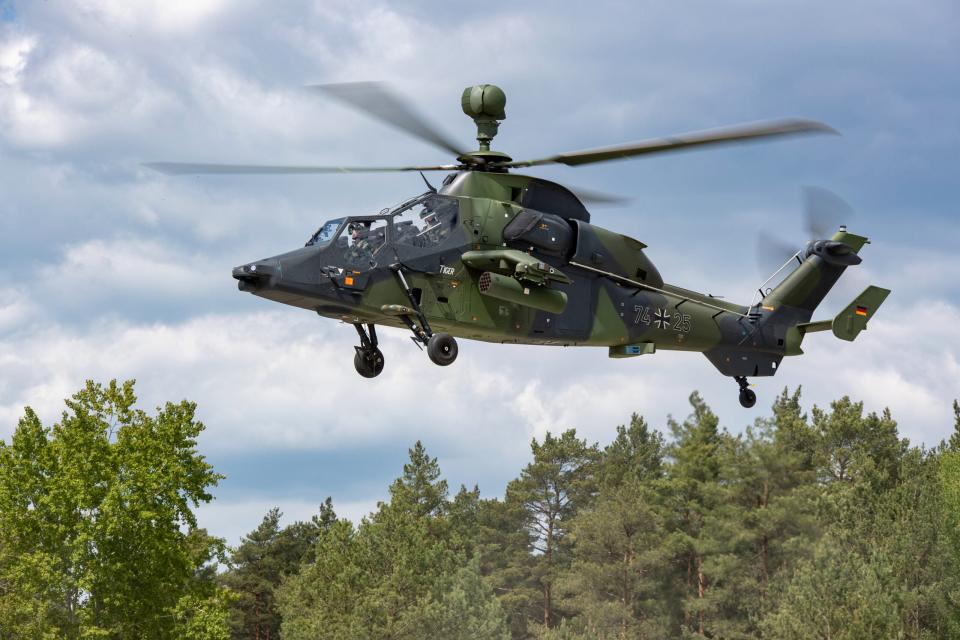
Outside of aircraft, low availability has also affected the German Armed Forces’ ships, submarines, and more, with a catalog of equally dismal mission-capable rates. There have even been times in recent years when none of the Germany Navy’s six Type 212A submarines have been operational.
At the same time, German authorities have continued to struggle to improve readiness across the country’s military.
Now, with Germany having steadily boosted its defense spending in response to Russian aggression in Ukraine and with a very modern VIP fleet provided for its officials, there shouldn’t be many excuses left for the kind of embarrassing situation that forced Foreign Minister Annalena Baerbock to cancel her high-profile trip.
Contact the author: thomas@thedrive.com

